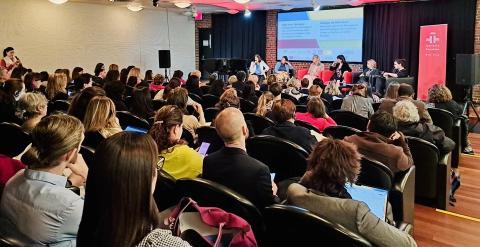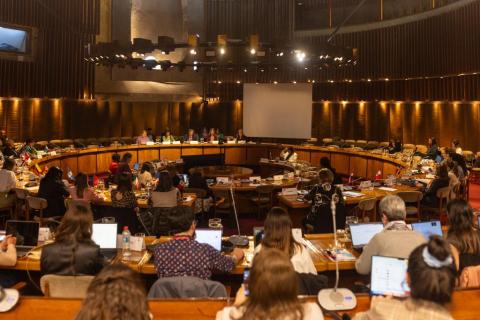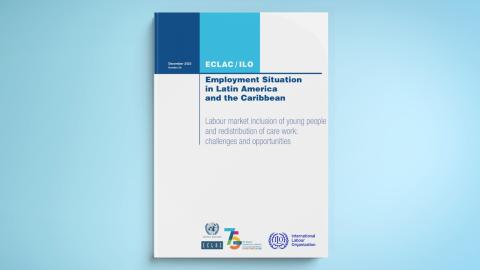News
Watch live transmission of the Conference
Read the speech of the ECLAC Executive Secretary
(15 October 2013) The twelfth session of the Regional Conference on Women in Latin America and the Caribbean, organized by the Economic Commission for Latin America and the Caribbean (ECLAC) to advance the region's gender equality agenda, was opened today in Santo Domingo in the presence of the President of the Dominican Republic, Danilo Medina.
President Medina declared "I celebrate our country being the host to this meeting that will show us new ways of guaranteeing equal rights and opportunities for the women in our societies". He also reiterated his government's zero-tolerance position on violence against women and violations of their fundamental rights.
He indicated that women in the Dominican Republic "face many interconnected challenges that have the same issue at their core: the lack of economic independence - which is aggravated by the lack of physical and political independence".
Other speakers at the opening session included Alicia Bárcena, Executive Secretary of ECLAC, Phumzile Mlambo-Ngcuka, Executive Director of the United Nations Entity for Gender Equality and the Empowerment of Women (UN Women), Carissa Etienne, Director of the Pan American Health Organization, Eleonora Menicucci, Brazil's Minister of the Secretariat of Policies for Women, and Alejandrina Germán, Minister for Women of the Dominican Republic.
According to the Executive Secretary of ECLAC "The Regional Conference on Women has become Latin America and the Caribbean's most important political forum on women's equality". She also thanked the Dominican Republic for its efforts in successfully organizing this event that brings together government authorities, international officials, experts and civil-society representatives.
Ms. Bárcena stated that this intergovernmental forum for debate "has served to generate, exchange and strengthen public policy proposals that many countries are now implementing to tackle the threefold challenge of achieving economic, political and physical autonomy for women".
She affirmed "Equality for women is another name for dignity and democracy. The aim is not to include women in a model that subordinates them, but rather we must change the paradigms of power".
The main topic of the twelfth session of the Regional Conference on Women that opened today in the capital of the Dominican Republic (until Friday 18) is gender equality, women's empowerment and information and communications technologies (ICTs).
According to Ms. Bárcena "Women's economic autonomy will only be possible insofar as there is a redistribution of total paid and unpaid work. We must have policies so that women can truly use the benefits of new technologies (particularly information technologies)". She also highlighted that this Conference will contribute to the Beijing+20 process and its links with the Post-2015 global sustainable development agenda.
In her speech, Phumzile Mlambo-Ngcuka, Executive Director of UN Women, said that access to ICTs is essential, as they boost women's income, independence and self-esteem.
The Director of UN Women underscored the region's role in the debate on the role of ICTs in the fight against poverty and equality, and stated "The Vice-President of the Dominican Republic told me that she believes that ‘the next Bill Gates' will come from her country and be a woman - and I agree".
Carissa Etienne, Director of the Pan American Health Organization, called on Conference participants to speak out on behalf of all those with no voice in their countries, and to promote political commitment and the public-private partnerships needed to guarantee that "together we ensure that the ICT revolution helps to advance women's rights and gender equality, including the right to health".
Eleonora Menicucci, Brazil's Minister of the Secretariat of Policies for Women, underlined the opportunity offered by the Conference to analyse the progress as well as the huge challenges still facing Latin American and Caribbean countries in terms of gender equality.
According to the Minister, the agreements reached at the First session of the Regional Conference on Population and Development in Latin America and the Caribbean, organized by ECLAC in Montevideo in August, could guide the work of countries in the Dominican Republic, particularly against the backdrop of the global process to define a new post-2015 development agenda.
The Minister for Women of the Dominican Republic, Alejandrina Guzmán, emphasized some government policies and actions to comply with the recommendations from previous Regional Conferences on Women.
These included the recognition of unpaid work, the implementation of time-use surveys in various countries, policies relating to the care economy and the positioning of gender parity and its incorporation in legal reforms. She also mentioned the Gender Equality Observatory for Latin America and the Caribbean, which is coordinated by ECLAC.
Speaking after the opening ceremony, Magaly Pineda, representative of civil-society organizations stated "We women want actions and not just words". The activist said "We do not want old hierarchies with new technologies", and put forward eight points to guarantee the democratization of infrastructure and technology, as well as full access for all women.
Delegates in the Dominican Republic are expected to sign the Santo Domingo Consensus, which will guide the gender equality policies of the region's countries over the next few years.
You can watch the Conference live online through the ECLAC website.
For further information, see ://www.eclac.cl/12conferenciamujer/default.asp?idioma=IN
Any queries or interview requests should be sent to the ECLAC Public Information and Web Services Section.
E-mail: prensa@cepal.org; Telephone: (56 2) 2210 2040.
Follow us on: Twitter, Facebook, Flickr and YouTube



